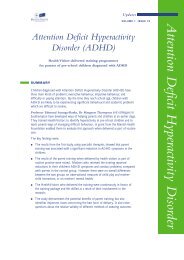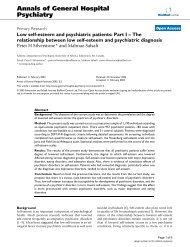are we paying enough attention? - Addiss
are we paying enough attention? - Addiss
are we paying enough attention? - Addiss
- No tags were found...
Create successful ePaper yourself
Turn your PDF publications into a flip-book with our unique Google optimized e-Paper software.
ADHD: PAYING ENOUGH ATTENTION?A RESEARCH REPORT INVESTIGATING ADHD IN THE UK“Bringing up a child with ADHD can be very rewarding, but can also have manychallenges. These <strong>are</strong> made more difficult by the fact that some newspapersrefer to children with ADHD as just naughty, and accuse p<strong>are</strong>nts of forcingdiagnosis on their children. Raising a child with ADHD is also made moredifficult as there is so little help and information available from the health andeducation authorities. I knew Yasmin was different from very early on, but shewasn’t diagnosed until she was in infant school. Ho<strong>we</strong>ver, once Yasmin wasdiagnosed I felt relief, because at last I would get some help for my daughter.”Sharon O’Dell, mother of Yasmin, 12, who has ADHDACCESSING THE SYSTEM AND ACHIEVING A DIAGNOSISAccording to NICE guidance, the prevalence of ADHD is 5% of school-aged children. Also according to NICE,ADHD is currently underdiagnosed in the UK. 4 1% of school-aged children meet the diagnostic criteria forsevere combined type ADHD and should receive treatment 4 (this equates to approximately 100,000 childrenin the UK). 7 Ho<strong>we</strong>ver only 70,000 children <strong>are</strong> currently receiving medication for their ADHD. 19 Over half(54%) of the child and adolescent psychiatrists and community paediatricians recently surveyed also statedthat ADHD is currently underdiagnosed in the UK. 13PAYING ENOUGH ATTENTION? KEY SURVEY FINDINGSThe survey participants <strong>we</strong>re asked what they thought the main barriers to effective identification anddiagnosis of ADHD in the UK <strong>we</strong>re. Reasons given included:-● Too few child and adolescent psychiatrists or paediatricians with an interest in mental health (85%)● GPs <strong>are</strong> unsure of which patients to refer (57%)● P<strong>are</strong>nts <strong>are</strong> not aw<strong>are</strong> of ADHD so don’t go to their GP (53%) 13●For those aw<strong>are</strong> of a problem, research conducted among children and p<strong>are</strong>nts on the subject of children’smental health found that the most common reasons p<strong>are</strong>nts gave for not contacting any services abouttheir child’s mental health problems included fear of being branded a failure or blamed (29%) 20The role of primary c<strong>are</strong> in initial identification of ADHD and referral to secondary c<strong>are</strong> specialists (child andadolescent psychiatrists and paediatricians) was highlighted by the experts surveyed.●●Over two thirds of specialists (72%) felt that GPs should have a key role in preliminary screening ofpatients who may have ADHD88% felt that GPs would benefit from increased education to improve their understanding of ADHD andthus improve the level of accurate referral 13Reports show that there is currently a delay of bet<strong>we</strong>en 9 months and 5 years bet<strong>we</strong>en a family firstapproaching their GP for help and advice and when they reach diagnosis by a specialist. 21“It is vital that primary and secondary c<strong>are</strong> work effectively together to manageADHD. Improved education is key to improving the referral process andhelping children with ADHD access secondary c<strong>are</strong> specialists.”Dr Amanda Kirby, a GP with a special interest in mental healthTeachers <strong>we</strong>re also highlighted as having a potential role in initially recognising ADHD in the classroom.43% of medical experts surveyed believe that a major barrier to diagnosis of ADHD is that teachers <strong>are</strong> notaw<strong>are</strong> and therefore do not realise that children should be referred to a medical professional. 13Page 8




